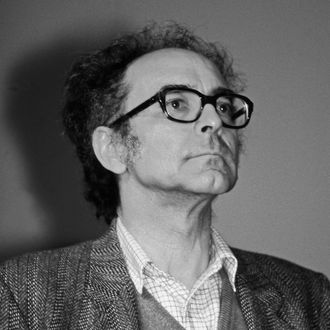
Jean-Luc Godard, a giant of cinema whose work helped pioneer the French New Wave, is dead at the age of 91. French newspaper┬áLib├®ration┬áreported on Tuesday, September 13, that Godard had died in his home in Rolle, Switzerland, by assisted suicide. ÔÇ£He was not sick; he was simply exhausted,ÔÇØ an unnamed family member reportedly said. ÔÇ£So he had made the decision to end it. It was his decision, and it was important for him that it be known.ÔÇØ Godard had told a Swiss radio program in 2014 that he was open to pursuing this option ÔÇö available to him as a longtime resident of Switzerland and dual citizen.
Born to a prominent family in Paris in 1930, Godard spent his childhood in Switzerland and returned as a young man to France, where he began his career in cinema as an enthusiast and critic. He launched his own short-lived film journal with peers Jacques Rivette and ├ëric Rohmer before writing for the now-legendary┬áCahiers du Cin├®ma.┬áThrough GodardÔÇÖs early Paris years of film fandom, he met fellow auteur Fran├ºois Truffaut.
GodardÔÇÖs first feature is one of his most influential: Breathless (1960)┬álaunched its star Jean-Paul Belmondo to fame and, along with films like TruffautÔÇÖs 1959┬áThe 400 Blows, introduced the world to an emerging style of French cinema.┬áBreathless┬áchallenged the staid sanctity of the shot and reverse shot with its jump cuts and mismatched eyelines ÔÇö all while introducing a new type of stylishness, toying with existentialism, playing with signifiers of American film noir, and looking extremely cool. Godard followed the success of┬áBreathless┬áwith a run of films including┬áA Woman Is a Woman, Vivre sa vie, Le petit soldat, Alphaville,┬áand┬áPierrot le Fou.┬áAll of these starred his collaborator and wife, Anna Karina, to whom he was married from 1961 to 1965.
GodardÔÇÖs work grew more directly political around the time of the 1968 student protests, and much of his output tilted experimental and engaged more directly with Marxist themes and criticisms of the Vietnam War. These include collaborations like┬áTout va bien┬áand┬áLetter to Jane┬áwith Jean-Pierre Gorin and indie output with his long-term partner Anne-Marie Mi├®ville.
In 2002, a┬áSight & Sound┬ácritics poll named Godard one of the greatest directors of all time ÔÇö after Orson Welles and Alfred Hitchcock. But unlike Welles and Hitchcock, Godard was still alive, creating, and continuing to push formal boundaries. A notable later work, 2014ÔÇÖs┬áGoodbye to Language, won the Jury Prize at the Cannes Film Festival.┬áGodard released his final film,┬áThe Image Book,┬áin 2018, which was awarded a Special Palme dÔÇÖOr at Cannes that year.


